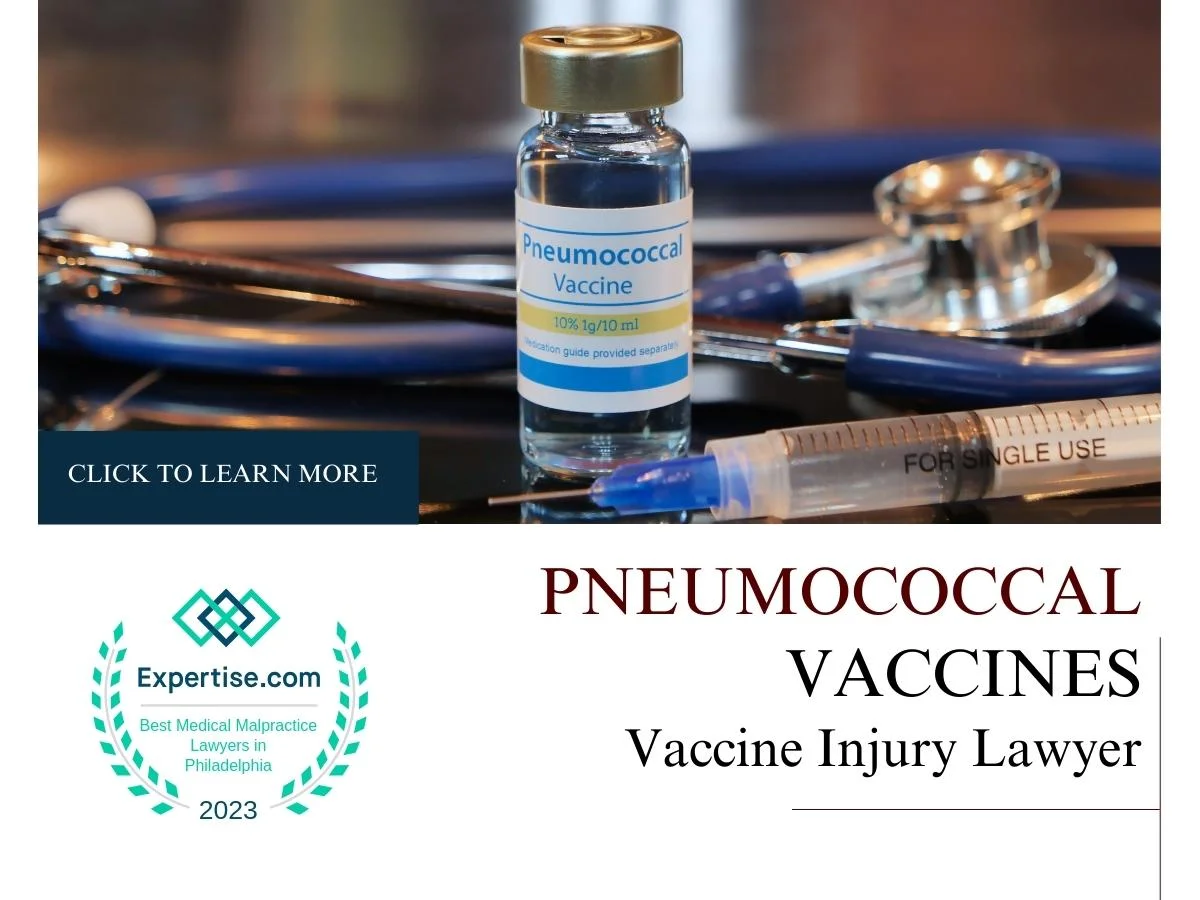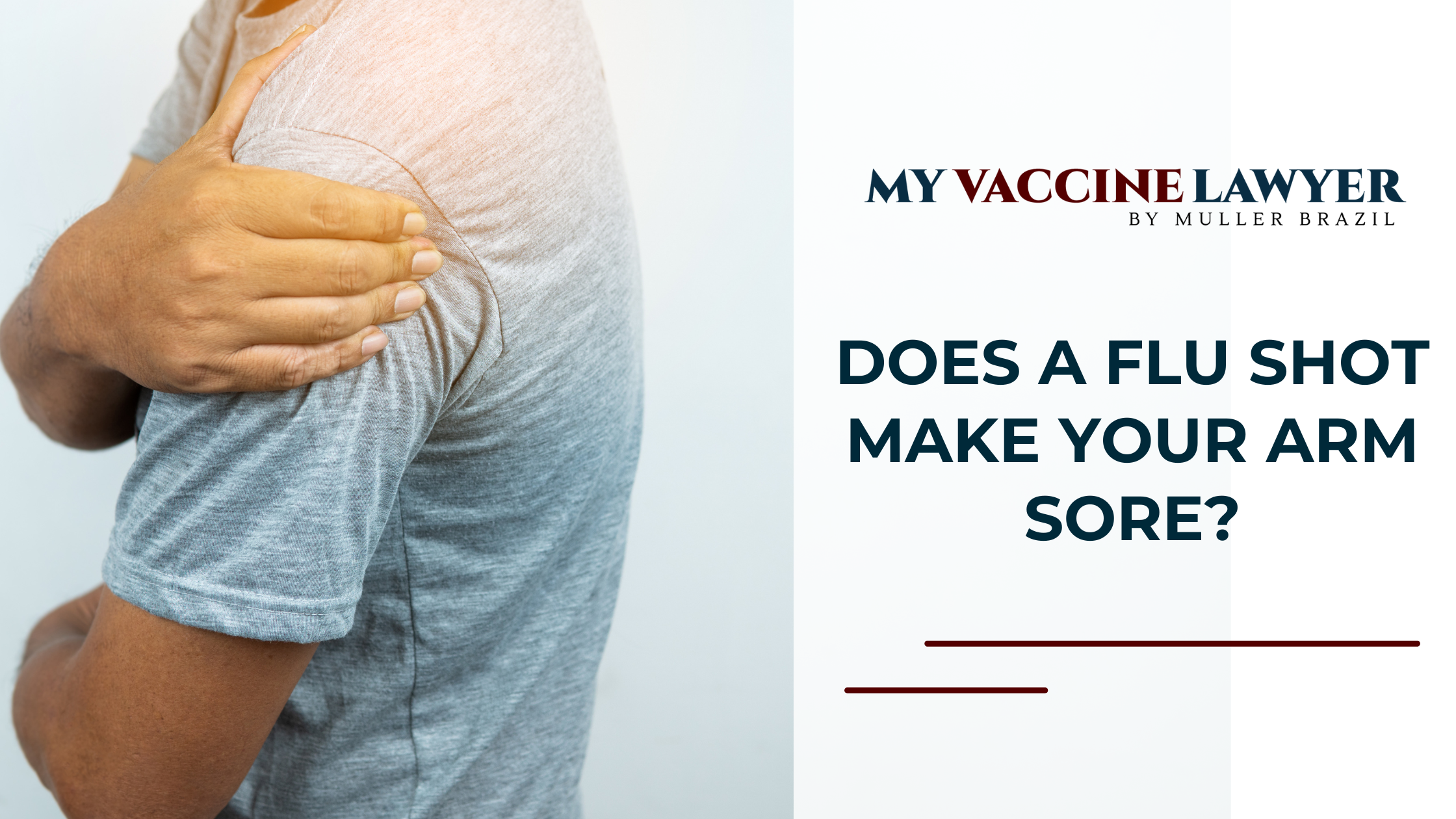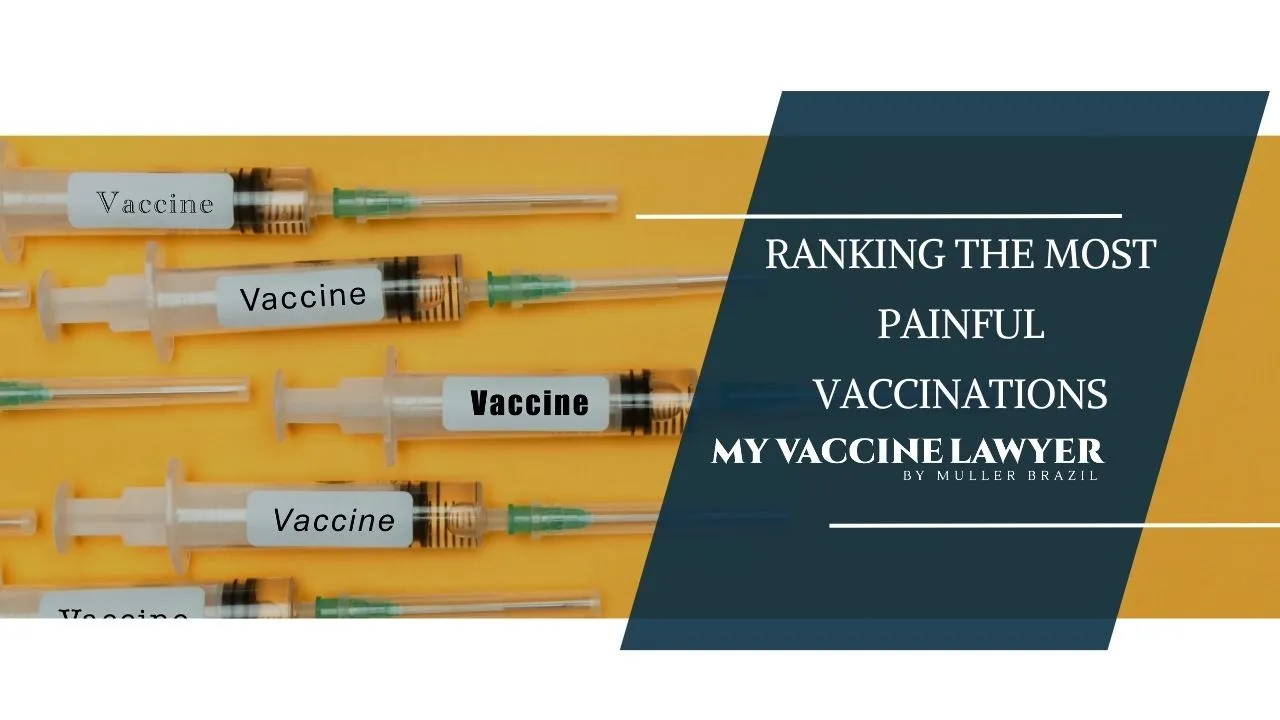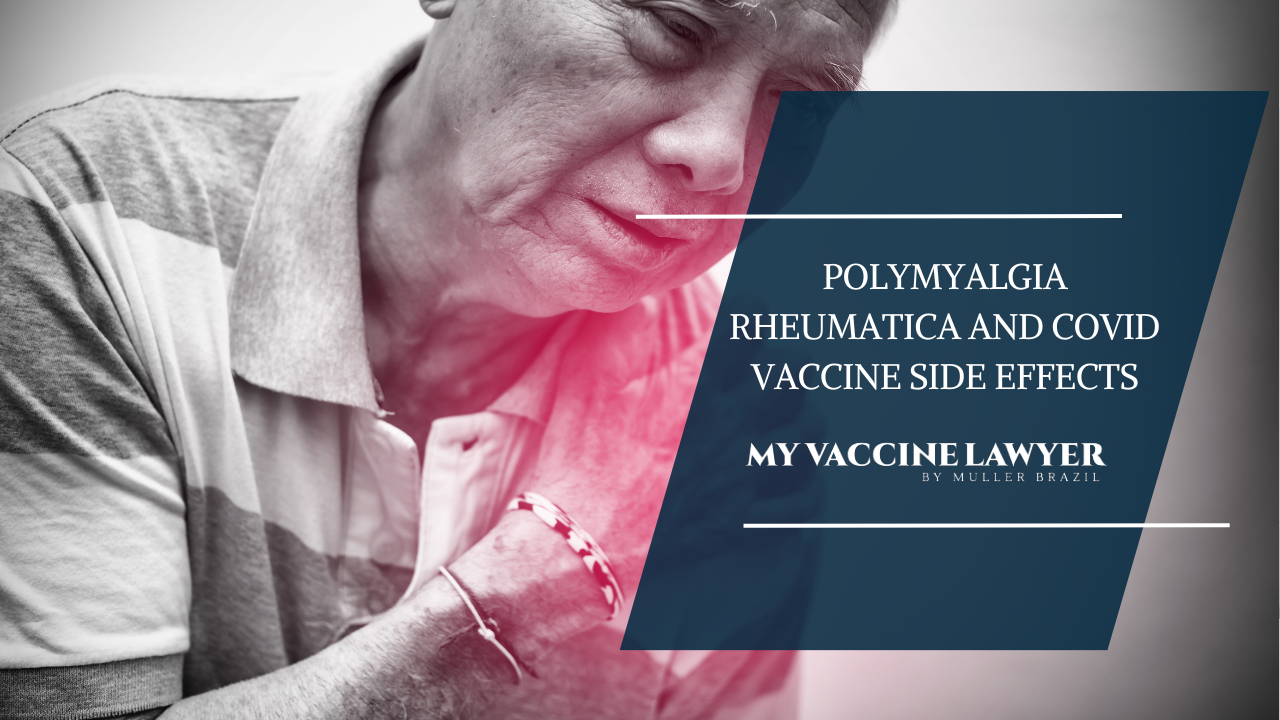Understanding Pneumococcal Vaccines: Types, Benefits, and Side Effects
Pneumococcal disease caused by streptococcus pneumoniae, though perhaps not a household name, poses a significant health risk that leads to thousands...
8 min read
Vaccine Injury Law Resources / Max Muller / COVID Vaccine Side Effects and Polymyalgia Rheumatica Insights
 Max Muller
:
Mar 15, 2024 11:57:07 AM
Max Muller
:
Mar 15, 2024 11:57:07 AM
If you're managing polymyalgia rheumatica (PMR), the COVID-19 vaccine may raise some concerns. Is it safe, or could it exacerbate PMR symptoms?
According to the Centers for Disease Control and Prevention (CDC), severe reactions to COVID-19 vaccines are rare, occurring at a rate of approximately 2 to 5 people per million vaccinated.
This article investigates the connection between PMR and the COVID-19 vaccine, breaking down the current safety and side effects evidence. We provide a concise analysis of the incidence of PMR post-vaccination, helping you make informed healthcare decisions without speculative distractions.
Polymyalgia Rheumatica (PMR) is an inflammatory rheumatic disease characterized by muscle pain, aches, and stiffness. It commonly affects the arms, hips, neck, and shoulders, reducing mobility in affected individuals.
PMR primarily affects older adults, with studies showing a higher frequency in populations over 50. The association with the HLA-DR4 gene and familial patterns suggests a potential genetic component. This further complicates this condition, which is one of the connective tissue diseases, including rheumatoid arthritis. Additionally, PMR is often associated with giant cell arteritis, another inflammatory condition affecting the blood vessels.
Recognizing PMR involves:
The journey of understanding PMR and its potential triggers can be intriguing and has led researchers to investigate possible associations with vaccinations, such as those for COVID-19.
Faced with a global pandemic caused by the new onset disease, sars cov 2, scientists raced to develop effective vaccines against the coronavirus disease (COVID-19). As a result, we now have three main types of COVID-19 vaccines:
These vaccines, including the booster dose, are designed to stimulate the immune system against the coronavirus and serve as an influenza vaccine, with the influenza vaccination working in different ways.
Despite the minor risk of autoimmune reactions, health authorities endorse COVID-19 vaccination as vital for reducing disease severity and mortality. But, like every medical intervention, vaccines are not without potential side effects, and monitoring these is an important part of guaranteeing vaccine safety. This is where the story of PMR and COVID-19 vaccines takes an interesting turn.
The association between vaccinations and inflammatory rheumatic diseases such as PMR is not new. Previous reports have described cases of PMR following influenza vaccinations, raising questions about possible connections between vaccines and PMR.
A proposed hypothesis suggests that mRNA vaccine components might change:
These are believed to contribute to triggering PMR. However, rare autoimmune diseases, including PMR, are rare after vaccination, requiring further research to verify a direct causal link.
There is an observed pattern of PMR onset or exacerbation shortly post-vaccination. This is often within the first fortnight after receiving a jab. Ongoing research aims to determine the relationship between PMR and COVID vaccination. It is unclear if the instances of PMR in vaccinated older adults are direct effects of the vaccine or coincidental.
Case studies and patients' personal accounts further explore this potential relationship.
Studies and case reports suggest a potential association between COVID-19 vaccines and the new onset of PMR. Symptoms of PMR developed on average 38 days after the first vaccine dose and 11.5 days after the second dose in studied patients. This indicates a link between the reporting of PMR and the use of COVID-19 vaccines.
Case reports detail individuals ranging in age and sex, with 70% being women and most receiving the Pfizer/BioNTech vaccine, experiencing new onset of PMR or relapses on average 10 days after vaccination.
This potential connection between COVID-19 vaccinations and PMR raises important questions about managing symptoms, diagnosis post-vaccination, and possible clinical manifestations.
Patients with PMR post-COVID-19 vaccination often exhibit inflammatory pain and stiffness. These primarily affect the shoulders, neck, and pelvic girdle, and can face difficulties with movements such as lifting arms or getting out of a chair.
Diagnosing PMR after getting a COVID-19 vaccine follows guidelines from 2012 by ACR/EULAR, which are often backed up by tests that show no presence of certain antibodies and are supported by imaging techniques like ultrasonography and PET/CT scans that can spot inflammation linked to PMR.
To identify PMR after vaccination, doctors look for high levels of inflammation indicators in the blood, such as C-reactive protein and erythrocyte sedimentation rate. These markers are key to spotting PMR early on. This helps manage the condition more effectively and quickly.
Glucocorticoid therapy, traditionally used to treat PMR, is effective for managing new onset PMR after vaccination, with improvement observed in most patients. A personalized prednisone dose (corticosteroid), starting usually around 15-20 mg and adjusted based on patient response, is important for controlling PMR symptoms post-vaccination.
In addition to prednisone, adjunctive treatments like methotrexate (antineoplastic) or tocilizumab (immunosuppressive) have been used successfully in some PMR cases following vaccination.
PMR's clinical presentation and treatment course post-vaccination do not significantly deviate from de novo PMR cases, indicating a similar disease process. This brings us to the role of pharmacovigilance in monitoring these treatments and their outcomes.
The CDC uses systems like the Vaccine Safety Datalink (VSD) to monitor vaccine safety. The Vaccine Adverse Event Reporting System (VAERS) is another tool for this purpose. The World Health Organization (WHO) maintains VigiBase. It's a global database for suspected adverse reactions. These systems track vaccine safety. Effective AEFI surveillance requires collaboration. This includes national regulatory authorities and immunization programs working together.
Despite progress, further efforts are needed to strengthen the global vaccine safety monitoring system and ensure coordinated AEFI reporting among health programs. This vigilance is necessary in balancing the risks and benefits of vaccination.
The safety of COVID-19 vaccines is supported by substantial research. Studies show no increased risk of death among vaccinated individuals. They are effective in preventing:
COVID-19 vaccines have undergone extensive testing in clinical trials. Over 650 million doses administered in the U.S. have proven safe. Serious long-term side effects are exceedingly rare, and the benefits of vaccination include reduced risk of COVID-19 reinfection. They also lessen the severity of the disease. Vaccination is a safer method for building immunity compared to natural infection.
While a potential link between COVID-19 vaccination and polymyalgia rheumatica (PMR) exists, the widespread public health benefits of vaccination overshadow the risk of developing autoimmune conditions such as PMR.
The vast benefits of COVID-19 vaccination, including controlling the spread of COVID-19 and reducing disease severity, greatly outweigh the small percentage of reported instances of vaccine-related to new-onset PMR.
This brings us to the need for further studies to understnad existing uncertainties, thus the usefulness of additional research is highlighted.
The connection between COVID-19 vaccinations and new onset PMR has been observed, but further detailed studies are needed to establish a definitive cause-effect relationship.
The presence of the DRB1*13:01 allele potentially increases the risk of vaccine-induced immune reactions precipitating conditions like PMR, and adjuvants in vaccines triggering inflammatory syndromes, merit thorough research.
The term "DRB113:01" refers to a specific genetic marker. This marker is found on the surface of immune cells and helps the body distinguish between its own cells and foreign invaders like viruses and bacteria.
Pharmacovigilance initiatives have been necessary in observing associations and generating safety signals between vaccines and autoimmune conditions. They highlight the need for more detailed cohort studies or pharmaco-epidemiological research to explore these findings. But what does this mean for the patients living with PMR post-vaccination?
There are stories of individuals experiencing excruciating pain in the form of severe joint pain after receiving the Pfizer COVID-19 vaccine. They would later be identified as symptoms of PMR and shed light on the personal experiences of patients.
An active runner described how the pain of PMR was very disabling seven months after vaccination. They were diagnosed with PMR after developing intense pain in the shoulders, hips, and knees related to joint bone spine issues. Glucocorticoid therapy was prescribed as treatment, which they were reluctant to take due to the necessity of additional medication.
Most patients with autoimmune conditions such as PMR, which developed post-COVID-19 vaccination, tended to recover with appropriate treatment. Many cases are mild and managed without needing more than standard care. This leads us to preventative measures and the importance of awareness in the context of the disease course.
.jpg?width=421&height=237&name=Recognizing%20Symptoms%20Early%20The%20Clinical%20Presentation%20of%20CRPS%20(2).jpg)
Physicians should monitor for PMR symptoms, particularly in the two weeks following COVID-19 vaccination. Healthcare providers' awareness is key to prompt and effective PMR treatment after COVID-19 immunization. Vigilance for PMR symptoms should be increased during high vaccination periods.
Patients with PMR are advised to engage in the following lifestyle modifications:
Collaborating with a doctor to develop a customized treatment plan, possibly including lifestyle changes, is recommended for PMR management.
If you or someone you know is experiencing symptoms of Polymyalgia Rheumatica (PMR) following a COVID-19 vaccination, it's important to understand your rights and options. My Vaccine Lawyer is at your service to provide guidance and legal support.
The VICP is a federal program established to compensate individuals whom certain vaccines have injured. The COIVD vaccine is listed on the Vaccine Injury Table, which means that if PMR develops within a specified time after vaccination, it may be presumed to be caused by the vaccine, simplifying the compensation process.
Don't suffer in silence. If you believe your PMR symptoms may be related to a vaccine, contact My Vaccine Lawyer. Our experienced team can help you navigate the VICP and work towards the compensation you may be entitled to. Reach out for a free consultation to explore your legal options.
Take Control of Your Injury Today
It’s clear that while a connection has been observed, a definitive cause-effect relationship is yet to be established. The need for further research, vigilance in monitoring for symptoms post-vaccination, and awareness among healthcare providers and patients is pressing.
The benefits of vaccination outweigh the potential risks, and patients with PMR post-vaccination can manage their symptoms with appropriate treatment and lifestyle changes. The journey of understanding PMR and its triggers continues; every step taken is a stride towards a healthier future.
No, it is recommended to avoid alcohol when suffering from polymyalgia rheumatica, as it can worsen inflammation.
Methotrexate is recommended as the first-line steroid-sparing drug for polymyalgia rheumatica, providing an alternative to prednisone. Local corticosteroid injections may also be considered after consultation with a rheumatologist.
Polymyalgia rheumatica shares many symptoms with other diseases, including rheumatoid arthritis, tendonitis, bursitis, infections, fibromyalgia, Lyme disease, spondyloarthropathy, lupus, and vasculitis. It is important to consult a doctor for proper diagnosis and treatment.
Some rare side effects of the COVID-19 vaccine include chest pain, shortness of breath, and feelings of having a fast-beating, fluttering, or pounding heart. Be aware of these possibilities as you consider getting vaccinated.
While some studies and case reports suggest a potential association between COVID-19 vaccines and the onset of PMR, a definitive cause-effect relationship has not been established. Therefore, further research is needed to understand the connection.
Mr. Muller currently devotes the majority of his law practice to aggressively fighting for the victims of unsafe drug and medical device injuries, as well as vaccine injuries and vaccine reactions involving the flu shot, TDaP/DTaP vaccine, and more. He has handled hundreds of SIRVA injury cases (shoulder injury related to vaccine administration), especially those involving bursitis, tendonitis, frozen shoulder, and rotator cuff tears. Mr. Muller also handles cases where vaccines caused serious nerve injuries such as Guillain-Barre Syndrome. Mr. Muller has recovered millions of dollars in compensation for his clients in the Vaccine Injury Compensation Program.

Pneumococcal disease caused by streptococcus pneumoniae, though perhaps not a household name, poses a significant health risk that leads to thousands...

A flu shot can make your arm sore due to muscle irritation and your immune response, but persistent pain could signal a more serious issue requiring...

Some vaccines hurt more than others due to factors like the injection method, vaccine ingredients, and individual sensitivity relating to genetics...
